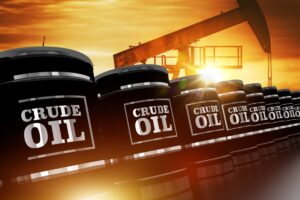Crude Oil Facts
Oil is a hydrocarbon. It is made up of hydrogen and carbon atoms bonded together. Crude oil contains many different kinds of hydrocarbons of which some are gaseous, many are liquid, and usually

there are some residual solid hydrocarbons. These different hydrocarbons all have distinct boiling points, so they can be separated through distillation. Chemical processing may be used to break down some hydrocarbons (like diesel fuel) into ones with higher demand (like gasoline). Crude oil also contains other substances, and their presence is part of what makes crude oil largely unusable before the refining process. Refining removes substances like water, oxygen, nitrogen, and sulfur.
The hydrocarbons produced by refining crude oil have countless uses. Gasoline is the most widely known oil product, and it is central to most transportation in the United States. The U.S. Energy Information Administration estimates that in 2013, Americans consumed over three billion barrels of gasoline. Diesel fuel is similarly used in transportation, and it powers the trucking industry and large industrial vehicles.
Crude oil also produces propane and butane, which are collectively known as liquefied petroleum gas (LPG). In the United States, propane is often used to heat gas grills and camping stoves. In rural areas, particularly areas where natural gas is unavailable, LPG can be used for heating and/or electricity. Kerosene is another hydrocarbon produced from crude oil. It is used in jet and rocket fuel. In the 19th century, Americans used kerosene to light oil lamps and in parts of the world where electricity is unavailable or too expensive, people still use kerosene for lighting. There are also heavy fuel oils that can be used by ships and in some industrial boilers. Lubricant oils are another hydrocarbon produced from crude oil. Motor oil is vital to keeping a combustion engine functioning well. Brake and hydraulic fluids are also hydrocarbon-based. Other uses for lubricant oils range from lubricating artificial joints to food grade oils. The heaviest product of refining crude oil is asphalt. It is most often used in road construction to bind loose stones and minerals together to form asphalt concrete. The other major use for asphalt is in roofing shingles.
About fifteen percent of the oil consumed in the U.S. is used for purposes other than fuel. This includes the aforementioned lubricant oils and asphalt, but it also includes uses like solvents for paints, inks, and lacquers. Other products produced include aspirin and antihistamines, synthetic fabrics, plastics and rubber, paraffin wax, and golf balls (the interior of a golf ball is made with polybutadiene, a petroleum-based polymer, which helps give the ball more bounce).
The oil industry is a vital part of American society and the innumerable goods produced from oil are literally all around us. However, the oil and natural gas industry is more than just energy and consumer goods. It provides good jobs at a time when those are increasingly hard to come by. Economists estimate that from 2002 to 2012, oil and natural gas exploration, drilling, and associated businesses have created more than one million jobs in the United States. The rest of the economy combined to create only 1.7 million jobs in that same time span.
The benefits of the U.S. oil and natural gas industry extend beyond job creation. Throughout the 1990’s and into the early 2000’s, the gap between how much energy the U.S. consumed and how much it produced grew significantly. In 2005, the energy we produced was equal to about seventy percent of what we consumed, and due to the increase in our energy production since then, current energy production is equal to nearly eighty-four percent of what we consume. Due to technological advances in frac’ing technology and horizontal drilling, the oil and natural gas industry has been able to increase the oil and gas production over the last few years. If the current production trend continues then the United States will become self reliant in its energy needs and less dependent upon foreign oil, which makes Americans more secure and more in control of our energy future.
